Unit 1: The Living World: Ecosystems | Fall Semester Exam
1/35
Earn XP
Description and Tags
Unit 1: The Living World: Ecosystems
Name | Mastery | Learn | Test | Matching | Spaced | Call with Kai |
|---|
No analytics yet
Send a link to your students to track their progress
36 Terms
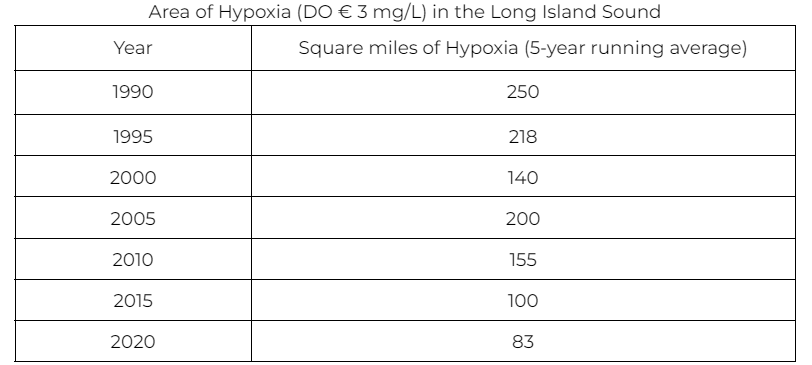
Based on the data table, which of the following scenarios may have led to the trend in the Long Island Sound?
a. decreased regulation of wastewater treatment plants
b. improved management of forest fires
c. reduction in the combustion of fossil fuels
d. reduction in nutrient runoff from farms and urban areas
reduction in nutrient runoff from farms and urban areas
The roots of many plants are infected with a specialized fungus. The plant supplies carbon to the fungus, and the fungus supplies nutrients to the plant. How can this relationship be classified?
a. Parasitic
b. Successional
c. Commensalistic
d. Mutualistic
Mutualistic
Several species of harmless kingsnakes mimic the color patterns of venomous coral snakes. If avoidance of toxic snakes is based solely on prior predator experience, what would happen if kingsnakes appeared in areas where coral snakes were never present?
a. Kingsnakes would evolve venom similar to that of coral snakes.
b. Predators would attack and eat kingsnakes.
c. Predators would initially attack and eat kingsnakes but soon learn to avoid them.
d. Predators would avoid kingsnakes.
predators would attack and eat kingsnakes
How does an algal bloom affect the oxygen content of the water?
An algal bloom will cause the oxygen content in the water to increase overall.
An algal bloom will cause the oxygen content to vary based on depth of the water.
An algal bloom will cause the oxygen content in the water to decrease, leading to hypoxic conditions.
An algal bloom will cause rapid fluctuations of oxygen in the water.
An algal bloom will cause the oxygen content in the water to decrease, leading to hypoxic conditions.
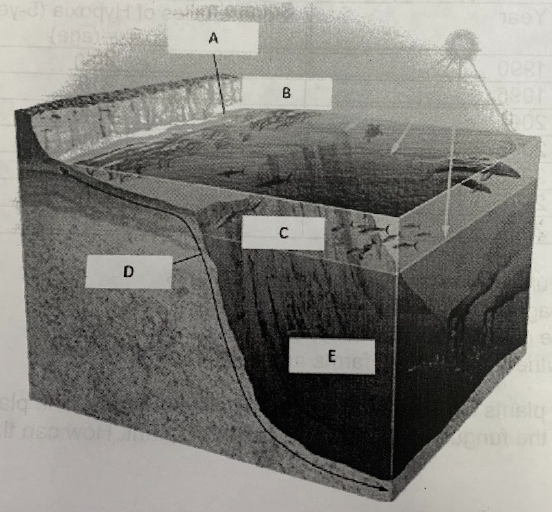
Which zone in the image above changes the most from high tide to low tide?
А
E
C
D
C
What do the tundra and taiga biomes have in common?
Nutrient poor soils
Rapid decomposition rates
High amounts of precipitation
Coniferous trees
Nutrient poor soils
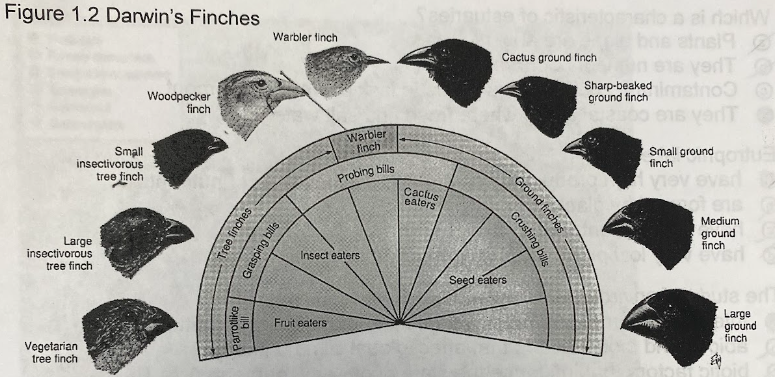
Darwin's study of finches in the Galapagos Islands provides an example of
morphological resource partitioning.
spatial resource partitioning.
metapopulations.
the competitive exclusion principle.
morphological resource partitioning

Looking at the ecological pyramid, what would be the most likely number of joules to fill in x, y, and z?
x=100; y =1,000; z =10,000
x=1; y =500; z =10,000
x=10,000; y = 500; z=1
x=10,000; y =1,000; z =10
x=100; y =1,000; z =10,000
A certain area's climate diagram has its precipitation line below its temperature line. The area is characterized by hot and dry conditions, with few plant species. Which type of biome fits these characteristics?
Taiga
Hot desert
Temperate seasonal forest
Tropical rainforest
Hot desert
Which is a characteristic of estuaries?
Plants and algae are absent.
They are nutrient poor areas.
Contaminants build up easily due to lack of water movement.
They are coastal areas where fresh and salt water mix.
They are coastal areas where fresh and salt water mix.
Eutrophic lakes
have very high productivity as a result of high levels of nutrients.
are formed by glaciers.
have low nutrient levels.
have very low productivity as a result of acid rain.
have very high productivity as a result of high levels of nutrients.
The study of environmental science primarily considers
interactions among human systems and those found in nature.
abiotic and biotic factors that affect global climate change.
biotic factors that influence the state of our environment.
the effect of human systems on biodiversity.
interactions among human systems and those found in nature.
What human activities have affected the phosphorus cycle?
Decline of wetland areas
Use dishwashing detergents
Reduction in use of fertilizers
Burning of fossil fuels
Use dishwashing detergents
How is the majority of energy within an ecosystem lost?
Cellular respiration
Heat loss
Energy used to grow biomass
Cellular metabolism
Heat loss
The majority of Earth's freshwater is unavailable for human consumption because
it is used for agriculture.
it is contaminated.
it is located too far underground.
it is contained in ice and glaciers.
it is contained in ice and glaciers.
According to the second law of thermodynamics, what happens to the total amount of energy in a system after it has been transformed?
It decreases until all of the energy is wasted as heat.
It increases and the excess energy is used for other processes.
It increases.
It remains the same, but its ability to do work diminishes.
It remains the same, but its ability to do work diminishes.
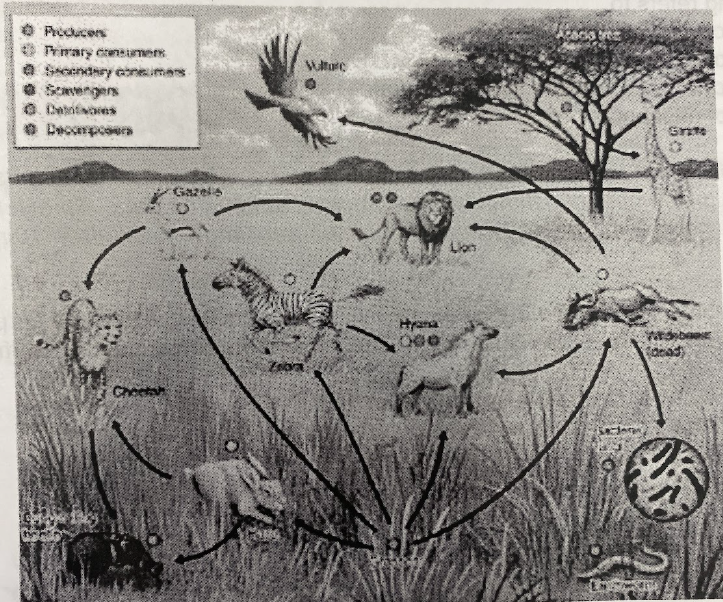
Which organism occupies a lower trophic level than the others?
Hyena
Vulture
Giraffe
Cheetah
Giraffe
A wetland ecosystem has an NPP of 1.02 kg C/m²/year and a GPP of 2.80 kg C/m²/year.
How much carbon is being used during respiration of producers?
1.76 kg C/m2/year
3.82 kg C/m2/year
2.75 kg C/m2/year
1.78 kg C/m2/year
1.78 kg C/m2/year
Why do tropical rainforests, deep ocean habitats, and temperate grasslands all support differing numbers and abundances of plant life?
Herbivores eliminate plant species in certain biomes.
The biomes have extreme temperature fluctuations that may harm plants.
Biomes receive varying amounts of solar energy for photosynthesis.
Each biome has limited space to support abundant plant life.
Biomes receive varying amounts of solar energy for photosynthesis.
Coral bleaching refers to
the effect of a coral parasite.
the result of overfishing in coral reefs.
the death of algae within the tissue of corals.
the effect of phosphates on coral reefs.
the death of algae within the tissue of corals.
“Researchers designed an experiment to test the hypothesis that air pollution positively correlates with the number of asthma-related problems among humans. To test this hypothesis, they compared medical records obtained from large hospitals in 10 major U.S. cities.“
Results of the study described in the passage indicated that cities with more air pollution had a higher number of patients with asthma. The most appropriate conclusion from this study is that
air pollution is associated with asthma in humans.
all urban asthma patients are impacted by air pollution.
air pollution causes asthma in humans.
there is no association between air pollution and asthma in humans.
air pollution is associated with asthma in humans.
“Researchers designed an experiment to test the hypothesis that air pollution positively correlates with the number of asthma-related problems among humans. To test this hypothesis, they compared medical records obtained from large hospitals in 10 major U.S. cities.”
The experiment described in the passage is an example of a
manipulative experiment.
natural experiment.
laboratory experiment.
controlled study.
natural experiment.
Which describes a key difference between photosynthesis and aerobic respiration?
Aerobic respiration has a higher energy efficiency than photosynthesis.
Photosynthesis generates organic compounds whereas aerobic respiration generates inorganic compounds.
Photosynthesis releases energy whereas aerobic respiration consumes energy.
Photosynthesis uses energy derived from external sources whereas aerobic respiration uses energy derived from internal sources.
Photosynthesis generates organic compounds whereas aerobic respiration generates inorganic compounds.
Which process uses water to transport nutrients through soil?
Infiltration
Nitrification
Leaching
Percolation
Leaching
Where is denitrification likely to occur?
In the presence of decomposers
In the atmosphere
Topsoil of freshly tilled croplands
Wastewater treatment plants
Wastewater treatment plants
Which zone contains phytoplankton, but not rooted plants?
Littoral
Benthic
Limnetic
Profundal
Limnetic
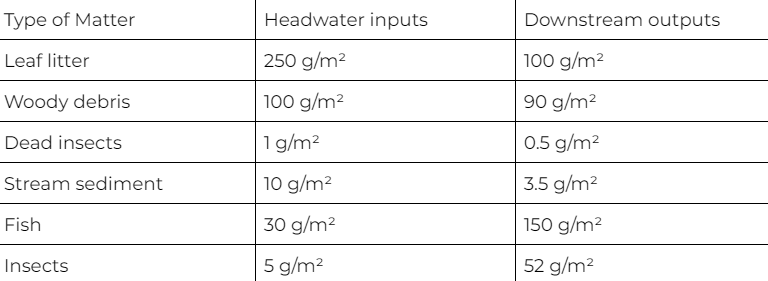
The table documents the material inputs and outputs to a 100-m section of forest stream. Which applies to the overall flow of organic material in this stream?
A closed ecosystem
A system with open boundaries
A brackish system
An oligotrophic system
A system with open boundaries
Approximately how does the productivity of tropical seasonal forests compare to the productivity of lakes and streams?
100 percent as productive
30 percent as productive
300 percent as productive
50 percent as productive
300 percent as productive
Which form(s) of nitrogen do producers readily utilize?
Ammonium (NH4⁺) and Nitrate (NO3-)
Nitrate(NO3-) and Nitrite(NO2-)
Nitrite(NO2-)
Atmospheric nitrogen(N2)
Ammonium (NH4⁺) and Nitrate (NO3-)
Which of the following correctly pairs the biogeochemical cycle with the primary human cycle?
Carbon, runoff
Water, fossil fuel combustion
Phosphorus, pavement
Nitrogen, fertilizers
Nitrogen, fertilizers
What might help restore an area that has been declared a dead zone because of algae blooms?
Add more decomposers to the area to devour the algae bloom faster
Introduce animals that are tolerant of low oxygen conditions to the area.
Reduce nutrient inputs to the area
Create more hypoxic areas nearby
Reduce nutrient inputs to the area
In an acre of grassland, net primary productivity is best measured as…
Carbon taken up by plants in sunlight
Carbon taken up by plants in sunlight plus carbon released by plants in the dark.
Carbon taken up by plants in sunlight minus carbon released by plants in the dark
Oxygen produced in the dark plus oxygen produced in the daytime.
Carbon taken up by plants in sunlight minus carbon released by plants in the dark
Humans have a considerable effect on the hydrologic cycle. Which of the following has a direct effect?
Producing fertilizers
Decomposition
Sedimentation
Urbanization
Urbanization
In a particular freshwater system, the addition of a predatory fish suppresses the large population size of dragonfly larvae. In this case, the predatory fish has which direct effect on the dragonfly larvae.
Negative feedback
Positive feedback
Interconnectedness
Competition
Competition
In a particular freshwater ecosystem, phosphorus is required to sustain plant growth. Regardless of the amounts of nitrogen or other mineral nutrients in the lake, aquatic plants in this system have been unable to mature without an increase in phosphorus. In this example, phosphorus can be described as a
Recycled element.
Limiting nutrient.
Negative feedback.
Hypoxic chemical.
Limiting nutrient.
The Pacific rat was introduced to Hawaii about 1000 years ago. In a short period of time after that introduction, there was a decline and ultimate extinction of many ground nesting birds in Hawaii. What caused the Pacific rat to be invasive in Hawaii but not in its native territory?
The pacific rat is not well suited for the biotic and abiotic conditions of Hawaii
The pacific rat is a very good tree climber.
The pacific rat is also non-native to every other place it is found.
The pacific rat has no enemies in hawaii.
The pacific rat has no enemies in hawaii.